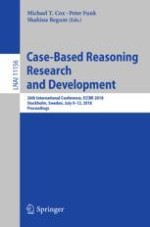2018 | OriginalPaper | Buchkapitel
Predicting Preferences by Means of Analogical Proportions
verfasst von : Myriam Bounhas, Marc Pirlot, Henri Prade
Erschienen in: Case-Based Reasoning Research and Development
Aktivieren Sie unsere intelligente Suche, um passende Fachinhalte oder Patente zu finden.
Wählen Sie Textabschnitte aus um mit Künstlicher Intelligenz passenden Patente zu finden. powered by
Markieren Sie Textabschnitte, um KI-gestützt weitere passende Inhalte zu finden. powered by
